#N4 grammar
Explore tagged Tumblr posts
Text
JLPT Grammar みたいだ・らしい・っぽい
What is the difference in usage among みたいだ、らしい、and っぽい? These grammar points can be difficult to differentiate, so I have gathered some notes and examples here. These grammar points are JLPT N4 or N3 grammar points.
★みたいだ★

Used for first-hand information or information you are observing for yourself.
Often used for something that has characteristics of something else (metaphorical similarities).
Most common in spoken language.
ここの砂は星みたい��形をしている。 ここ の すな は ほし みたいな かたち を して いる。 The grains of sand here are in the shape of a star.
このアパートは誰も住んでいないみたいだ。 この アパート は だれ も すんで いない みたい だ。 It looks like no one lives in this apartment building.
明日は雨みたいね。 あした は あめ みたい ね。 It looks like rain tomorrow.
リンさんみたいに日本語がうまくなりたい。 I want to be able to speak Japanese as well as Lin.
★らしい★

Used for things you infer, or information you have from another source.
Often used to something that has especially strong characteristics of its group (stereotypical similarities).
Most common in spoken language.
今日は春らしい暖かい日でした。 きょう は はる らしい あたたかい ひ でした。 Today was a warm spring-like day. *Note: It is spring, and this is a stereotypically spring day.
私は女性らしい洋服はあまり着ない。 わたし は じょせい らしい ようふく は あまり きない。 I don't often wear feminine type clothes.
寝すぎるのは体に悪いらしいです。 ねすぎる の は からだ に わるい らしい です。 Sleeping too much is apparently bad for your body. *Note: Second-hand source of information.
今日は君らしくないな。 きょう は きみ らしくない な。 You don't seem like yourself today.
★っぽい★
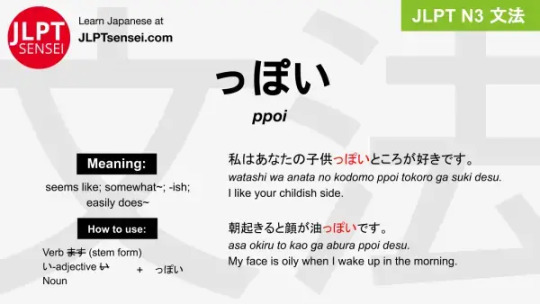
Can be used to say what something is like.
Can be used to say that something appears to be the opposite of what you would expect.
Can be used to describe something that someone is likely to do or often does.
Note:
When following a noun or い-adjective, the meaning is similar to -ish, -like, -ly. The number of adjectives that can be used with this grammar are limited. Usually negative when used after a noun or adjective, but not always.
When following a verb, the meaning is easy to do, often do. This grammar cannot be used with all verbs.
あの小学生は大人っぽい。 あの しょうがくせい は おとなっぽい。 That elementary school student acts like an adult.
油っぽい食事は好きじゃない。 あぶらっぽい しょくじ は すき じゃ ない。 I don't like oily foods.
飽きっぽいから何事も成功しないのだ。 あきっぽい から なにごと も せいこう しない の だ。 You don't succeed in anything because you are quick to lose interest.
年を取ると、忘れっぽくなる。 とし を とる と、わすれっぽく なる。 As one gets older, one tends to become more forgetful.
#日本語#japanese#japanese language#japanese langblr#japanese studyblr#langblr#studyblr#文法#japanese grammar#jlpt n3#jlpt n4#tokidokitokyo#tdtstudy
159 notes
·
View notes
Text
N4 文法: はずがない
はずがない= cannot be (its impossible)
How to use:
verb stays in dictionary form + はずがない
For な-adjective you な before the はずがない, for nouns you add の before.
Examples:
彼はそなことを言うはずがない- he would never say that
そんなはずがない。- That cannot be true
彼女の話は本当のはずがない- her story cannot be true
そな大きな量を全部食べられるはずがない- there's no way you can eat that whole portion
#japanese#language learning#studyblr#日本語#japan#langblr#nihongo#learn japanese#study kanji#learn kanji#japanese grammar#jlpt n4
95 notes
·
View notes
Text
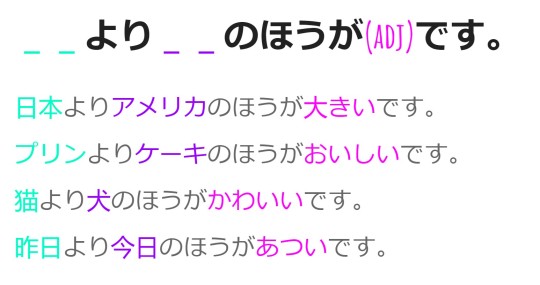
___ is (comparative adjective) than ___.
America is bigger than Japan.
Cake is more delicious than pudding.
Dogs are cuter than cats.
Today is hotter than (it was) yesterday.
30 notes
·
View notes
Text
The Complete JLPT N4 Grammar Video(Game) Textbook
youtube
16 notes
·
View notes
Text
096 JLPT N4 Grammar 文法・例文:~たばかり
096 JLPT N4 Grammar 文法・例文:~たばかり
096 JLPT N4 Grammar 文法・例文:~たばかり 接続:動詞のタ形+ばかり 意味:Just, have just 来(き)たばかりです Just came 買(か)ったばかりです Just Bought 出(だ)したばかりです Just served 食(た)べたばかりです I just ate 例文 先月日本(せんげつにほん)へ来(き)たばかりです。I just came to Japan last month. 買(か)ったばかりの傘(かさ)をなくしてしまった。I lost my umbrella that I just bought. さっきメールを出(だ)したばかりなのに、もう返事(へんじ)が返(かえ)ってきた。I just sent an e-mail but already got a…
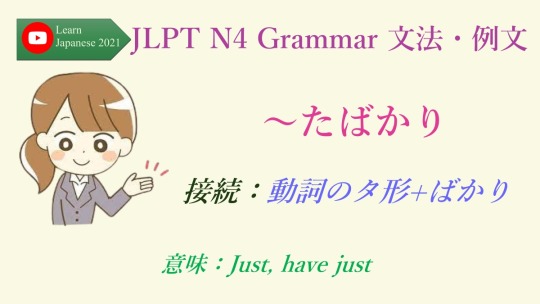
View On WordPress
18 notes
·
View notes
Text
Haikyuu Touch The Dream Game Transations
Hi!!! I’ve recently got Haikyuu Touch the Dream (currently only available in Japan and Korea rn) and I've been translating the game to practice my Japanese skills and wanted to share my translations for anyone else playing the game.
My translations are done from using a mazii translate/dictionary,google image translate, Jisho, and my own Japanese knowledge so translation will not be 100% accurate
START SCREEN
I’m missing some screenshots of the beginning, but usually the popups when you first get/open the game is just about downloading an update.

On the start screen there are 2 yellow buttons in the bottom right corner. Data Transfer (引継ぎ(ひきつぎ)) and notification (お知らせ(おしらせ). Notification leads to the news bulletin board (I'll get into that later) There can also be a 3rd blue button in the top left that allows you to re-watch the intro story cutscene.
Data Transfer (引継ぎ(ひきつぎ))

I believe if you don't have an account this is where you can first log in (I made an account a long while ago before I fully started playing so I cant remember x.x) Sign in with Google/Apple
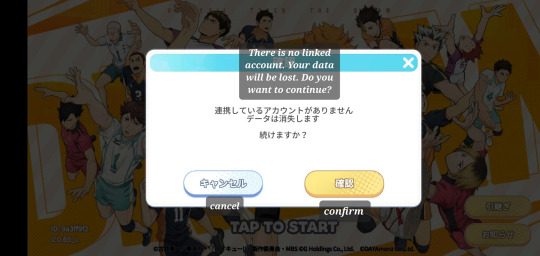
Japanese: 連携しているアカウントがありませんデータは消失します続けますか? English: There is no linked account. Your data will be lost. Do you want to contiune. Code

Japanese: 引継ぎコードを入力してください
English: Please enter the transfer code
#haikyuu touch the dream#haikyuu#karasuno#ハイドリ#ハイキュー#translations not 100% accurate im like N4-ish#Please feel free to correct! there are def some grammar particles and expressions/slang I am not familar with
15 notes
·
View notes
Text
also i learned that one of my japanese colleagues is very interested in kanji and etymology and just linguistics generally and i think this is going to help a lot with my studies!
#she keeps telling me my japanese is really good and i'm like. you've never heard me speak japanese but thank you#she's seen my horrible kanji (the ones the kids told me were shit) and my n4 grammar book where i got 60% on the review quizzes#so yeah she knows for certain that my japanese is terrible#still... i think i'm gonna try speaking japanese with her a bit and ask her for grammar explanations when i don't understand!
10 notes
·
View notes
Text
七夕(たなばた)

Today, 7 July, is Tanabata, a Japanese festival centered around stars, the milky way, romance, as well as hopes and aspirations for the future.⭐✨
If you want to find out more about the customs and history of Tanabata in simple Japanese, take a look at the texts and articles below. Most of these texts have a reading level fitting for JLPT N5 and N4 readers and all texts are freely available online!
Hirogaru (ひろがる)
The article on the website hirogaru introduces the star festival with large pictures and few sentences. You can toggle furigana for this text in theory but it might not work depending on your device. However, all text also has a read out loud function. There is also a small reading comprehension quiz at the end.
https://hirogaru-nihongo.jp/hoshi/article/tanabata/

NIHONGOSCHOOL Blog
On Kazue Ono's blog, she writes about the Tanabata festival in three levels: for starters, beginners and intermediate readers. The blog post has audio options for all three levels, can be downloaded as a PDF and also features a reading comprehension quiz here.
https://www.nihongoschool.co.uk/post/にほんごブログ:七月七日

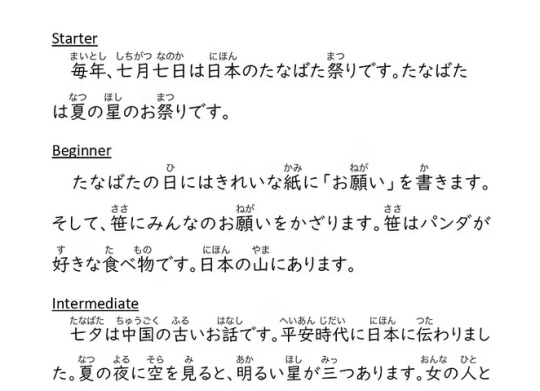
Watanoc (和タのC)
Although the free web magazine Watanoc hasn't had new articles for a while now, their article about Tanabata still holds up and gives a great overview about the festival. You can hover over words and phrases to get the reading as well as a translation into English. After each paragraph you can also click to translate the entire sentence into English as well.
https://watanoc.com/post-1607-tanabata
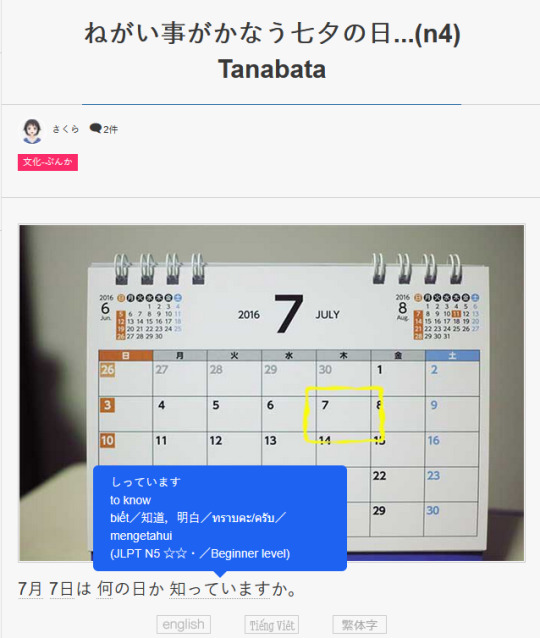
Matcha Magazine
If you are interested in reading about the street festivals and parades taking place, Matcha Magazine recommends some great Tanabata festivals in the Kanto region to check out. Their article has full furigana and added spaces between words.
https://matcha-jp.com/easy/367


Hukumusume (福娘物語)
There is a legend behind Tanabata and you can read it in a simpler Japanese version on hukumusume, which is a place for free online children's stories. Although this text is not written with learners in mind, it features both furigana and cute colorful illustrations that guide readers along.
Please scroll past the videos at the beginning of the page. The full text is just below.
http://hukumusume.com/douwa/kisetu/tanabata/s5_html/02.htm

Tadoku no Hiroba (たどくのひろば)
For learners approaching intermediate abilities (N4-N3), I can recommend this short story by Tadoku no Hiroba. It is both longer than the articles above and features more complicated grammar points and speech registers, but still features 100% furigana on all kanji.
https://tadoku.info/wp-content/uploads/2023/01/7gatsu7katanabata_ruby.pdf
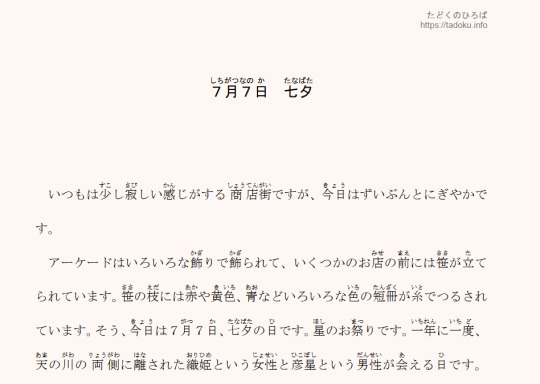
#my book reviews#reading in japanese#日本語#study japanese#learning japanese#やさしい日本語#七夕#たなばた#tanabata#free japanese reading resources#articles in japanese#blogs in japanese#japanese reading comprehension#読書#読解#jlpt n5#jlpt n4
77 notes
·
View notes
Text
❁My favourite Japanese YouTube channels for advanced learners ❁
(Part one because tumblr is showing glitches when I try and edit further)
1.
Their JLPT lives and classes have saved my life on many occasions! When I started watching their videos they had only N3-N1 lessons taught in Japanese, but I believe they now also have N4 lessons in English. I also like their お金になるJLPT series a lot!
2.
Their N2 kanji playlist is the best I’ve seen on YouTube!
3.
I mentioned her podcast in the previous post, but she also has a lot of grammar and vocabulary lessons posted
4.
Her keigo and business Japanese playlists are really helpful, I always watch them when I need to brush up on it!
5.
The N1 grammar playlist is a lifesaver and covers everything
6.
Her vocabulary videos are really useful, I also love how she covers a lot in every lesson. Her vlogs using N1 vocab are great too!
7.
I will probably make a whole post on their 3 rules of onomatopoeia video because it has saved my life for JLPT, I’m now able to guess the answer based on these rules even if I have never seen the word before (and I used to struggle with onomatopoeia a lot)
8.
I love her conversation videos and vlogs! Probably suitable for intermediate learners too
9.
Amazing for kanji, especially if you’re also learning to write them!
10.
Also really helpful for JLPT preparation!
Please let me know in the comments if you know any others :)
129 notes
·
View notes
Text
So because language learning is an eternal struggle, here's some of my progress from this month and the things I've learned during the past 8 months
1. 70% listening, 30% vocab/grammar/writing
Studying a language is 70% listening practice and the other 30% is memorization. I picked up my Japanese studies this year after having watched anime for years, and I noticed that it's so much easier to make progress. I've internalized around 500-1 000 words and some basic grammar, so getting through N5/N4 was a breeze - in 2 weeks I achieved the same level that took me 3 months in Chinese. I can watch anime without subtitles and easily understand what they're saying (when did this happen? No idea!) because I understand the expressions and slang, all which would not be possible if I hadn't spent so much time with media.
I often have a hard time focusing on watching shows etc. because of how much of a critic I am, but it's the most important thing. Immerse yourself.
2. Reset your learning schedule if it gets too overwhelming
This is something I only learned this week, as I'd been stubbornly holding onto those 900+ word reviews waiting for me back in Ninchanese.
I've been at a standstill for the past 2-3 months after studying the radicals because of some personal responsibilities, and I never got around to learning any new vocab, I was just too busy trying to keep up with what I had learned previously.
But now I've reset my schedule, and I FINALLY feel like I'm making progress again. Sure, my memory might be hazy for the latter parts of HSK 4, but you know what to do about that? You immerse yourself with listening practice so that they will stick with you when you hear them be used IRL :)
#language#language stuff#language learning#chinese language#chinese langblr#japanese#langblr#study tips
92 notes
·
View notes
Text
・Vocabularies of the day:
枝 (えだ) - branch
株 (かぶ) - (tree) stump, stock (financial). This one is fun because it's the same pronunciation as turnip, which is why in animal crossing you buy and sell turnips like stocks.
拾う (ひろう) - to pick up (e.g. off the ground)
・Grammar points studied:
1. である: written Japanese
This lesson was about the だ/である. It's a formal style of writing that has an authoritative tone. It's often used for things like academic papers, legal documents, and sometimes newspaper articles. In this style, verbs at the end of sentences will be in casual form, and where you might hear です in spoken Japanese, you might see である or だ.
2. ~が欲しい・~てほしい
This two-part lesson explains how to say you 'want' something (a noun that can be possesed) with ~が欲しい.
For example: パソコンが欲しい。
With ~てほしい, you can say that you want someone else to do something. For example,
田中さんに事務所に来てほしいです。(I want Tanaka to come to the office)
・Kanji practice (anki's kanji damage deck) Current percent mature: 98.95%
・Current grammar progress (using marumori.io):
N5 - 82/82
N4 - 57/110
N3 - 0/180
N2 - 0/200
N1 - 0/250
36 notes
·
View notes
Text
Podcast Review: Let's Talk in Japanese

Podcast Title: Let's Talk in Japanese!
Ease of Listening: ★★★★★
Length of Episodes: ★★★★★
Level of Engagement: ★★★★★
Episode Frequency: ★★★★★
Overall: ★★★★★
Today I will be reviewing the Let's Talk in Japanese! podcast by Tomo-sensei. This podcast is aimed at Japanese learners who want more chances to listen to spoken Japanese but using vocabulary and grammar that they can understand. The podcast is for levels N1 (the highest level) to N5 (the lowest level), but I would say that a majority of the content is focused on level N3 or N4.
Do I currently listen to this podcast?: Yes, I like this podcast a lot and listen to it frequently.
General Overview
Good For Levels: Beginner | Intermediate | Advanced
In this series, Tomo, a Japanese teacher for foreign students, discusses in Japanese only a variety of topics either selected by him or suggested by the audience. These can range from topics about daily life to JLPT related topics. He understandably discusses topics that he has a decent knowledge of, and admits when there are gaps. He is quite faithful to the level of each episode, which he indicates at the end of the episode title, so you can be sure that you will be able to understand the majority of the content or challenge yourself as the case may be.
Length of Episodes ★★★★★
The podcasts are usually around 10-15 minutes long. This is ideal for a quick listen when you are short on time or just want to supplement your studies, but may not be ideal if you are looking for something a bit longer. I usually listen to two or three podcasts in a row during my commute and feel like I've spent my time well. The short length can be useful if you are not interested in a particular topic, because you can make it to the end of the episode without losing interest and a new topic will come up with the next episode.
Level of Engagement ★★★★★
Although this is just one person (Tomo) talking throughout the podcast, he is engaging because he speaks as though he is talking to a small group. I find it engaging because I can, in the privacy of my room or car, reply to him when he poses questions, or make a response if I am surprised by what he says, etc. Even though it's not interactive per se, it can feel interactive because of the way he speaks in his podcast. I find myself engaged in most episodes, and the shorter length means I don't have to work as hard to stay engaged through the entire episode.
Episode Frequency ★★★★★
New podcasts come out about weekly, and sometimes more frequently than that. I have heard that he works very hard to put out the podcasts so frequently, and I think this intense schedule plus the large archive of material means you can listen almost indefinitely to this podcast.
Overall ★★★★★
This podcast is completely in Japanese and designed by a Japanese teacher for foreigners learning Japanese, and has material for everyone from beginners to advanced learners. The shorter episodes mean you can fit it into a busy schedule, and the JLPT labels mean you can pick and choose episodes based on your own level and be confident that you will get what you expect. I highly recommend this for those looking to improve their listening skills.
#日本語#japanese language#japanese langblr#japanese studyblr#langblr#studyblr#japanese podcast#podcast review#tokidokitokyo
172 notes
·
View notes
Text
Knowledge of the Japanese Language Proficiency Test (JLPT) and NAT Scoring Systems
The Japanese Language Proficiency Test (JLPT) and NAT exams are two of the most widely recognized language proficiency tests for Japanese language learners. Both exams are designed to evaluate the language skills of non-native Japanese speakers, but they have distinct scoring systems that can be confusing for test-takers. In this article, we'll delve into the details of the Japanese Language Proficiency Test (JLPT) and NAT scoring systems, helping you understand how to interpret your scores and set realistic goals for your language learning journey.
JLPT Scoring System
The Japan Foundation and Japan Educational Exchanges and Services (JEES) administer the JLPT, which is available in five levels: N1, N2, N3, N4, and N5. The test evaluates language skills in three areas: language knowledge (vocabulary), reading, and listening. The scoring system is based on a scale of 0 to 180 points, with 100 points required to pass.
N1: Advanced level, requiring a high degree of language proficiency (100–180 points)
N2: Upper-intermediate level, requiring a good command of Japanese (100–180 points)
N3: Intermediate level, requiring a moderate level of language proficiency (100–180 points)
N4: Elementary level, requiring a basic level of language proficiency (100–180 points)
N5: Basic level, requiring a limited level of language proficiency (80–180 points)
NAT Scoring System
The NAT exam, administered by the Tokyo University of Foreign Studies, is designed for students who wish to study at a Japanese university. The test evaluates language skills in four areas: vocabulary, grammar, reading, and listening. The scoring system is based on a scale of 0 to 400 points, with 240 points required to pass.
Level 1: Advanced level, requiring a high degree of language proficiency (360–400 points)
Level 2: Upper-intermediate level, requiring a good command of Japanese (280–359 points)
Level 3: Intermediate level, requiring a moderate level of language proficiency (240–279 points)
Level 4: Elementary level, requiring a basic level of language proficiency (200–239 points)
Level 5: Basic level, requiring a limited level of language proficiency (0–199 points)
Key Differences
While both exams evaluate language proficiency, there are key differences in their scoring systems. The JLPT has a more nuanced scoring system, with a greater range of points available for each level. In contrast, the NAT exam has a more straightforward scoring system with a clear distinction between levels.
Tips for Test-Takers
Understanding the scoring system is crucial for setting realistic goals and developing an effective study plan. Here are some tips for test-takers:
Familiarize yourself with the exam format and content.
Set specific, achievable goals for each section of the exam.
Practice with sample questions and mock tests to improve your time management and test-taking strategies.
Focus on your weaknesses and allocate more study time to those areas.
In conclusion, understanding the Japanese Language Proficiency Test (JLPT) and NAT scoring systems is essential for language learners who wish to demonstrate their proficiency in Japanese. By recognizing the differences between the two exams and setting realistic goals, you can optimize your study plan and achieve success in your language learning journey.
33 notes
·
View notes
Text
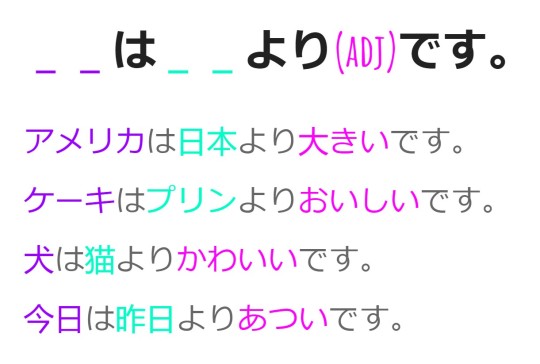
___ is (comparative adjective) than ___.
America is bigger than Japan. [America is (than Japan) bigger.]
Cake is more delicious than pudding. [Cake is (than pudding) more delicious.]
Dogs are cuter than cats. [Dogs are (than cats) cuter.]
Today is hotter than (it was) yesterday. [Today is (than yesterday) hotter.]
24 notes
·
View notes
Text
#45 てしまう / ちゃう How To Stop Sounding Like a Robot
youtube
2 notes
·
View notes
Text
JLPT N4 例文で学ぶ漢字 「下」、カ、ゲ、した、しも、さ・げる、さ・がる、くだ・す、お・りる
音読み:カ、ゲ 訓読み:した、しも、さ・げる、さ・がる、くだ・す、お・りる以下(いか) Below値下(ねさ)げする Decrease低下(ていか)する Decrease下(お)りる go down下(さ)がる go down下(さ)げる lower上下(じょうげ)する Go up or down下(くだ)さる go down 例文 8(はっ)歳以下(さいいか)は入場無料(にゅうじょうむりょう)です。Admission is free for children under 8 years old. 人口増加率(じんこうぞうかりつ)が低下(ていか)している。Population growth is declining. 円(えん)の価値(かち)が下(さ)がることを���安(えんやす)という。A fall in the value of the yen is called a…

View On WordPress
4 notes
·
View notes